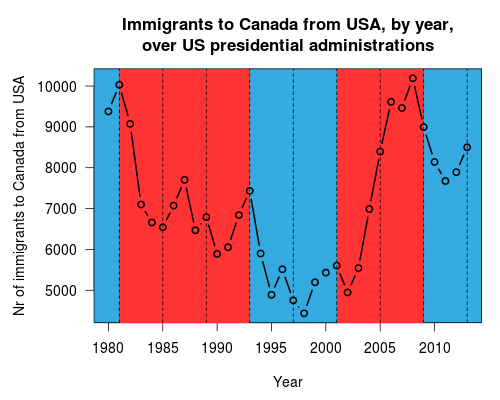It’s another presidential election year in the USA, and you know what that means: Everyone’s claiming they’ll move to Canada if the wrong candidate wins. But does anyone really follow through?
Anecdotal evidence: Last week, a Canadian told me she knows at least a dozen of her friends back home are former US citizens who moved, allegedly, in the wake of disappointing election results. So perhaps there’s something to this claim/threat/promise?
Statistical evidence: Take a look for yourself.

As a first pass, I don’t see evidence of consistent, large spikes in migration right after elections. The dotted vertical lines denote the years after an election year, i.e. the years where I’d expect spikes if this really happened a lot. For example: there was a US presidential election at the end of 1980, and the victor took office in 1981. So if tons of disappointed Americans moved to Canada afterwards, we’d expect a dramatically higher migration count during 1981 than 1980 or 1982. The 1981 count is a bit higher than its neighbors, but the 1985 is not, and so on. Election-year effects alone don’t seem to drive migration more than other factors.
What about political leanings? Maybe Democrats are likely to move to Canada after a Republican wins, but not vice versa? (In the plot, blue and red shading indicate Democratic and Republican administrations, respectively.) Migration fell during the Republican administrations of the ’80s, but rose during the ’00s. So, again, the victor’s political party doesn’t explain the whole story either.
I’m not an economist, political scientist, or demographer, so I won’t try to interpret this chart any further. All I can say is that the annual counts vary by a factor of 2 (5,000 in the mid-’90s, compared to 10,000 around 1980 or 2010)… So the factors behind this long-term effect seems to be much more important than any possible short-term election-year effects.
Extensions: Someone better informed than myself could compare this trend to politically-motivated migration between other countries. For example, my Canadian informant told me about the Quebec independence referendum, which lost 49.5% to 50.5%, and how many disappointed Québécois apparently moved to France afterwards.
Data notes: I plotted data on permanent immigrants (temporary migration might be another story?) from the UN’s Population Division, “International Migration Flows to and from Selected Countries: The 2015 Revision.” Of course it’s a nontrivial question to define who counts as an immigrant. The documentation for Canada says:
International migration data are derived from administrative sources recording foreigners who were granted permission to reside permanently in Canada. … The number of immigrants is subject to administrative corrections made by Citizenship and Immigration Canada.
